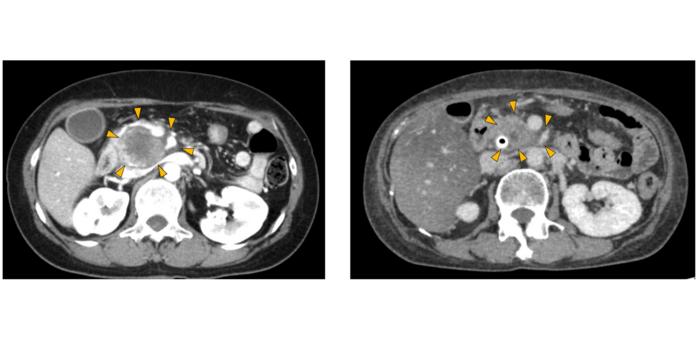
Researchers in Japan have unveiled a groundbreaking predictive model that promises to revolutionize the treatment landscape for patients with advanced pancreatic cancer. Pancreatic cancer, infamous for its poor prognosis and limited treatment options, poses significant challenges in clinical management, especially when determining the potential efficacy of surgical interventions following chemoradiotherapy. By integrating the nuances of tumor marker levels with detailed genetic information from patients, this novel model enhances the precision of survival outcome predictions, potentially guiding more personalized and effective treatment strategies.
Tumor markers are critical in oncology, serving as biochemical indicators that reflect the presence and progression of malignancies. Traditionally, clinicians have relied on these markers—proteins or molecules secreted by cancer cells or produced by the body in response to tumor development—to monitor disease severity and treatment response. However, these conventional methods evaluating tumor markers often falter due to intrinsic biological variability between patients, undermining their reliability as universal diagnostic or prognostic tools.
The newly developed Tumor Marker Gene Model (TMGM) addresses this limitation by considering the patient’s genotype, specifically focusing on the FUT2 and FUT3 genes, which substantially affect tumor marker expression. Genetic variants within these genes influence the baseline levels of tumor markers such as Carbohydrate Antigen 19-9 (CA 19-9) and DUPAN-2, thereby altering the biochemical landscape independent of cancer severity. Consequently, without accounting for these genetic factors, tumor marker readings may misrepresent the true clinical state, leading to suboptimal treatment decisions.
In their comprehensive multi-center retrospective study, the researchers meticulously analyzed DNA samples alongside clinical tumor marker data from pancreatic cancer patients undergoing preoperative therapy. Their findings showed that integrating FUT2 and FUT3 genotypes into conventional tumor marker evaluation significantly refined prognostic accuracy. The TMGM outperformed standard models by approximately 15% in predicting survival, marking a substantial leap forward in precision medicine for pancreatic cancer.
Perhaps most crucially, the TMGM demonstrated exceptional value in stratifying patients with tumors initially deemed inoperable. Classically, surgeons refrain from operating on these tumors due to their extension to vital vascular structures or other technical challenges. Nonetheless, chemoradiotherapy can sometimes shrink these tumors to operable sizes, but identifying which patients will truly benefit from subsequent surgery has remained imprecise and risky. The TMGM’s capacity to integrate genetic normalization of tumor markers enables oncologists to discern potential surgical candidates more accurately, ultimately sparing certain patients from unnecessary procedures and offering curative opportunities to others who might have been previously overlooked.
This research illuminates a profound insight about the relationship between tumor markers and genetic factors. The data revealed that fluctuations in tumor marker levels correlate more strongly with the patient’s inherited genetic variations than with the actual advancement of the malignancy. This paradigm shift underscores the imperative for clinicians to reconsider how tumor marker data are interpreted in clinical contexts, advocating for a genotype-informed framework that could prevent diagnostic errors and improve treatment outcomes.
Moreover, the TMGM represents a significant advancement in the era of personalized oncology, where integrating genomic information with traditional clinical markers is key to unlocking tailored treatment modalities. By normalizing tumor marker levels based on individual genetic profiles, this model transcends the conventional “one-size-fits-all” approach, acknowledging the molecular diversity among patients and its impact on biomarker presentation.
The development of TMGM also reflects the power of multidisciplinary collaborations, uniting expertise in molecular genetics, oncology, and data science. The study was spearheaded by Prof. Haruyoshi Tanaka from Nagoya University Hospital, supported by teams from Nagoya Medical Center and Toyama University, showcasing the strength of integrating clinical data with cutting-edge genetic analyses.
From a clinical perspective, adopting the TMGM could transform preoperative assessment protocols. Currently, decisions surrounding pancreatic cancer surgery are fraught with uncertainty, relying heavily on imaging and less personalized biochemical markers. Incorporating genetic normalization into this paradigm offers an evidence-based tool that enhances surgical candidacy assessments, optimizes resource allocation, and potentially improves patient survival rates in a cancer type notorious for late-stage diagnosis and poor therapeutic response.
Furthermore, the implications of this research extend beyond pancreatic cancer. The principle of genotype-specific adjustment of tumor markers may be applicable across various malignancies, signaling a new frontier where cancer biomarkers are interpreted through the lens of personalized genomics. This approach could pave the way for more precise disease monitoring, early detection, and individualized treatment pathways in oncology at large.
In conclusion, the Tumor Marker Gene Model is a promising innovation that bridges the previously unmet gap between genetic variability and tumor marker interpretation in pancreatic cancer management. By refining prognostic accuracy and enhancing the identification of surgical candidates after chemoradiotherapy, this model embodies a critical step towards more intelligent, patient-specific cancer care. As future studies validate and expand upon these findings, TMGM has the potential to become a cornerstone in the standard-of-care protocols for pancreatic malignancies.
This pioneering work was published recently in the British Journal of Surgery, signaling an important milestone in the integration of genetic insights and clinical oncology. Clinicians, researchers, and patients alike stand to benefit from this enhanced understanding, which holds promise to improve the grim statistics associated with pancreatic cancer through smarter, genomically informed treatment strategies.
_____________________________________________________________________
Subject of Research: People
Article Title: FUT2 and FUT3 specific normalization of DUPAN-2 and Carbohydrate Antigen 19-9 in preoperative therapy for pancreatic cancer: a multi-center retrospective study (GEMINI-PC-01)
News Publication Date: 29-Apr-2025
Web References: http://dx.doi.org/10.1093/bjs/znaf049
Image Credits: Haruyoshi Tanaka, Nagoya University Hospital
Keywords: Pancreatic tumors, Cancer patients, Surgery, Cancer genetics, Human genetics, Pancreatic cancer, Cancer research, Genetic variation, Chemotherapy, Cancer screening, Tumor growth, Tumor regression
Tags: advanced pancreatic cancer managementbiochemical indicators of malignancychemoradiotherapy efficacy in cancerFUT2 and FUT3 gene influencegenetic factors in cancer prognosisimproving treatment outcomes in pancreatic cancernovel cancer predictive modelspancreatic cancer treatment strategiespersonalized medicine for pancreatic cancerprecision oncology advancementspredictive model for cancer survivaltumor markers in oncology





